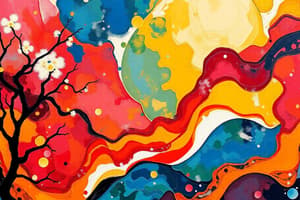Podcast
Questions and Answers
Which art movement emphasizes capturing the subjective impression of light and color?
Which art movement emphasizes capturing the subjective impression of light and color?
- Realism
- Abstract Art
- Conceptual Art
- Impressionism (correct)
What is the primary focus of Conceptual Art?
What is the primary focus of Conceptual Art?
- The idea or concept behind the work (correct)
- The physical object itself
- The beauty of nature
- The technical skills of the artist
Which art movement during the Romantic period often focused on the beauty of nature and the individual's emotional response to it?
Which art movement during the Romantic period often focused on the beauty of nature and the individual's emotional response to it?
- Abstract Art
- Conceptual Art
- Romanticism (correct)
- Impressionism
What is the primary goal of Realism in art?
What is the primary goal of Realism in art?
Which art style does not depict a recognizable subject, instead using shapes, colors, forms, and gestural marks?
Which art style does not depict a recognizable subject, instead using shapes, colors, forms, and gestural marks?
What is crucial for those interested in pursuing a career as an artist?
What is crucial for those interested in pursuing a career as an artist?
What is art primarily considered as?
What is art primarily considered as?
Which of the following is NOT mentioned as an art form in the text?
Which of the following is NOT mentioned as an art form in the text?
What can art reflect?
What can art reflect?
Which of the following statements about the history of art is true?
Which of the following statements about the history of art is true?
What is realism in art characterized by?
What is realism in art characterized by?
Based on the information provided, which of the following statements is true?
Based on the information provided, which of the following statements is true?
Study Notes
Art is an expression of human creativity using various mediums. It encompasses a wide range of activities, including painting, sculpture, printmaking, photography, architecture, and performance arts such as theatre, dance, music, films, and literature. These art forms can reflect the culture, history, social values, and beliefs of different civilizations across time. There are many types of art and it varies greatly depending on the individual artist's style and the artistic movement they belong to. Here, we will explore some aspects of this creative field.
History of Art
The history of art extends back thousands of years. Cave paintings from the Paleolithic era show evidence of early humans expressing themselves through visual art. As different civilizations developed over time, so did their unique styles and techniques in creating art. For example, Ancient Greece had a strong focus on realism and idealization, while Egypt was known for its hieroglyphics and monumental tomb paintings. The Renaissance period brought about new ways of thinking and created the foundations of modern art. From there, movements like Romanticism, Impressionism, Abstract Expressionism, and Conceptual Art evolved, shaping the contemporary art world.
Techniques and Styles of Art
Artists have been experimenting with various techniques and styles throughout history. Some common ones include:
Realism
Realism is characterized by accurately representing objects or scenes as they appear in everyday life. The goal is to capture reality as precisely as possible, often focusing on the details of a subject.
Impressionism
Impressionism is an art movement that emerged in the late 19th century in France. It emphasizes the subjective impression of the artist, capturing light and color in their natural settings.
Abstract Art
Abstract art is a style that does not depict a recognizable subject. Instead, it uses shapes, colors, forms, and gestural marks to achieve its effect.
Conceptual Art
Conceptual art is a contemporary art movement that focuses on the idea or concept behind the work, rather than the physical object itself.
Art in Society and Culture
Art has played a significant role throughout history in shaping society and culture. It can reflect the values, beliefs, and trends of a particular time or place. For instance, during the Romantic period, artists often focused on the beauty of nature and the individual's emotional response to it. Today, art continues to be a powerful tool for expression, social commentary, and connecting with diverse communities.
Art Education and Training
Art education is crucial for those interested in pursuing a career as an artist. There are numerous educational institutions offering degrees and programs in various art disciplines, such as fine arts, graphic design, animation, and more. These programs provide students with the technical skills and theoretical knowledge needed to succeed in the field.
In conclusion, art is a diverse and dynamic field that has been an integral part of human culture and history. From its earliest beginnings to the contemporary scene, art has continuously evolved and adapted to reflect and shape the world around us. Whether it's through painting, sculpture, performance, or any other form, art continues to inspire and challenge us, pushing boundaries and exploring new possibilities.
Studying That Suits You
Use AI to generate personalized quizzes and flashcards to suit your learning preferences.
Description
Delve into the rich history, diverse techniques, and profound impact of art on society and culture. Learn about different artistic movements, styles like Realism, Impressionism, Abstract Art, and Conceptual Art, and the role of art education in nurturing creativity and skills.




